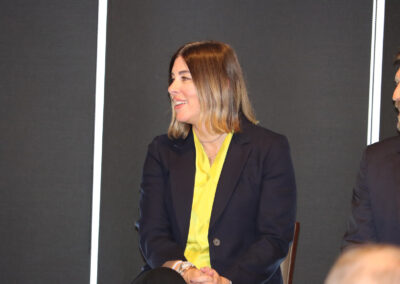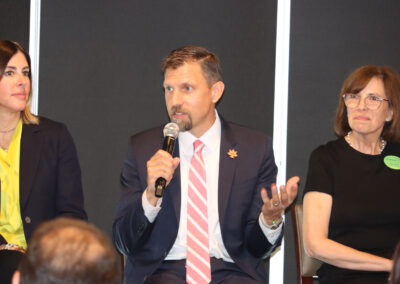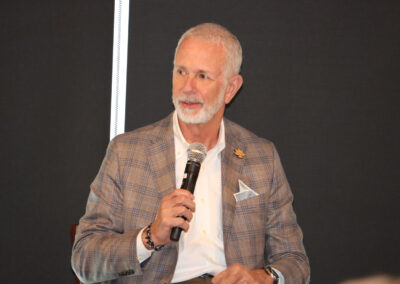The Gwinnett Chamber’s recent On Topic: State of Rowen event, presented by Porter Steel, brought together nearly 200 community and business leaders for a sold-out conversation on the future of the Rowen development. The discussion offered timely insights into the project’s long-term vision, measurable progress, and collaborative strategy—centered on environment, agriculture, and medicine.
Panelists included:
- Brian Brodrick, Jackson Spalding (Moderator)
- Mason Ailstock, Rowen Foundation
- Rebecca Alexander, Gwinnett Technical College
- Kelley Balkcom, Georgia Power
- Bob Hughes, HGOR
Panelists acknowledged the partnership with Gwinnett County to complete Rowen’s $32 million infrastructure phase—known as “complete streets”—which includes two miles of new roads, pedestrian paths, and green spaces. This is Georgia’s first and only green roads project, featuring stormwater biofiltration systems and reduced-concrete zones to mitigate heat island effects. These early investments prepare the 2,000-acre site for phased development supporting 22 million square feet of research, commercial, and residential space.
Mason Ailstock described Rowen as a “knowledge community,” emphasizing its location within an hour of more than 50 colleges and universities. This access fuels research partnerships, workforce development, and innovation commercialization. Foundational sectors include agriculture, medicine, environmental science, sensor technologies, and drug development—positioning Rowen at the intersection of science and technology.
A 2025 site selection study identified energy availability, labor, and available land as top priorities for companies—each of which Rowen is uniquely positioned to meet. With reliable energy infrastructure, a skilled regional workforce, and a master-planned site, Rowen offers a strong value proposition for future-focused enterprises.
In alignment with its mission to foster innovation, Rowen has launched a “Living Labs” initiative through partnerships with the University System of Georgia and the Technical College System of Georgia. This program transforms the Rowen site into a dynamic environment for real-world experimentation and learning. Current projects under this initiative focus on developing academic programs that address workforce needs in emerging industries such as electric mobility, energy, and infrastructure. Additionally, collaborations with the Georgia Network for Electric Mobility aim to explore advancements in autonomous mobility, smart city technologies, and sustainable practices. These efforts position Rowen as a hub for interdisciplinary research and practical innovation .
The Rowen Foundation leads this public-private partnership with a long-term economic development strategy benefiting Georgia and the broader Rowen Region. At full buildout, Rowen is projected to support 100,000 jobs and generate $10 billion annually in economic impact. The region—including Gwinnett and 10 surrounding counties—is expected to account for 43% of Georgia’s population growth by 2050, reinforcing Rowen’s role as a hub for innovation and workforce opportunity.
Combined with Georgia’s pro-business policies and incentive programs, Rowen presents a compelling opportunity for companies seeking long-term growth rooted in innovation and impact.
For more information, visit rowenlife.com.














